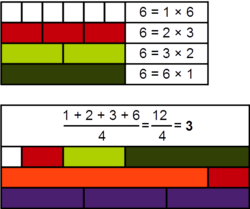Arithmetic number
 From HandWiki - Reading time: 5 min
From HandWiki - Reading time: 5 min

In number theory, an arithmetic number is an integer for which the average of its positive divisors is also an integer. For instance, 6 is an arithmetic number because the average of its divisors is
which is also an integer. However, 2 is not an arithmetic number because its only divisors are 1 and 2, and their average 3/2 is not an integer.
The first numbers in the sequence of arithmetic numbers are
- 1, 3, 5, 6, 7, 11, 13, 14, 15, 17, 19, 20, 21, 22, 23, 27, 29, 30, 31, 33, 35, 37, 38, 39, 41, 42, 43, 44, 45, 46, 47, 49, ... (sequence A003601 in the OEIS).
Density
It is known that the natural density of such numbers is 1:[1] indeed, the proportion of numbers less than X which are not arithmetic is asymptotically[2]
where c = 2√log 2 + o(1).
A number N is arithmetic if the number of divisors d(N ) divides the sum of divisors σ(N ). It is known that the density of integers N obeying the stronger condition that d(N )2 divides σ(N ) is 1/2.[1][2]
Notes
- ↑ 1.0 1.1 Guy (2004) p.76
- ↑ 2.0 2.1 Bateman, Paul T.; Erdős, Paul; Pomerance, Carl; Straus, E.G. (1981). "The arithmetic mean of the divisors of an integer". in Knopp, M.I.. Analytic number theory, Proc. Conf., Temple Univ., 1980. Lecture Notes in Mathematics. 899. Springer-Verlag. pp. 197–220. http://www.math.dartmouth.edu/~carlp/PDF/31.pdf.
References
- Guy, Richard K. (2004). Unsolved problems in number theory (3rd ed.). Springer-Verlag. B2. ISBN 978-0-387-20860-2.
 |
 KSF
KSF
